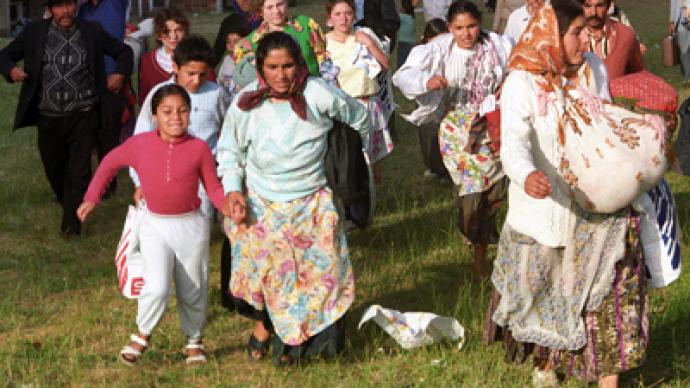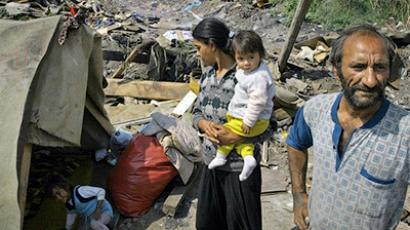EU members seek to re-introduce Balkan visas to stem influx of asylum-seeking gypsies

Six EU member states have asked the European Commission to adopt a mechanism that would allow them to terminate visa-free travel from West Balkan states. The request follows an exponential rise in mainly Roma asylum-seekers from the region.
Interior ministers of Germany, Austria, France, Belgium, the Netherlands, and Luxembourg have sent a proposal of a suspension clause, which is expected to be passed during the next EU ministers meeting on October 25. It can then be activated at any moment."A massive influx of people asking for asylum with no real reason to have international protection are basically blocking, and creating serious problems for, the functioning of the asylum systems of many member states," said European Commission spokesperson Cecilia Malmstrom.Citizens of Albania, Bosnia-Herzegovina, Macedonia, Montenegro and Serbia, none of whom are full European Union members, are allowed to freely travel throughout Europe after a series of treaties signed in 2009 and 2010, allowing them to join the Schengen Agreement.But many have done more than travel.For instance, in 2010, 78 Serbian and Macedonian passport-holders applied for asylum in Germany. Last month alone, 2,435 people from the same countries did the same, according to official Interior Ministry statistics. The numbers have jumped several times just from this summer.The scheme is simple.Immediately upon arriving from their home country, immigrants apply for asylum, usually on the basis of ethnic discrimination. Once the application is processed by the legal system, it is usually rejected, but until then, the seeker is funded by a special welfare payment."We're seeing an influx of relatively large family groups. When these individuals remain in Germany for eight weeks or a quarter year, they're able to save enough to finance the remainder of the year back home," said Manfred Schmidt, president of Germany’s Federal Office for Migration and Refugees.Financial payments to refugees are around three times the average salaries in the origin states. The procedure can be repeated several times in different EU states.“The increasing abuse of the asylum system is not acceptable,” plainly declared German Interior Minister Hans-Peter Friedrich, who has been leading the fight against the influx, as his country has provided the preferred destination for the travellers. He also pointed out that the “fake claims” are harming actual refugees, who have seen their applications delayed as immigration offices struggle to cope.The vast majority of asylum-seekers are ethnic Roma, who were legally disadvantaged in Eastern Europe during Communist times, but now theoretically enjoy the same rights as the majority population. They do continue to suffer from noticeably lower education levels, living standards and life expectancies than the national averages in Balkan states."This is an entirely inappropriate sentiment, scaremongering aimed directly at refugees," Marei Pelzer, a consultant with German refugee advocacy group Pro Asyl, said about the propsed suspension. She told Deutche Welle that most of the claims she has encountered are genuine, and that gypsies are simply taking a new opportunity to fight discrimination that continues to exist. A possible re-introduction of visas was already touted in May 2011, when the problem first became apparent.Balkan states to curtail the flow of failed asylum applicants, only to see their numbers grow ever faster.Now, Serbia is scrambling to save its visa-free privileges, regarded as a major breakthrough for the once-ostracized country, and has offered a radical solution."This is about less than 10,000 asylum seekers in all of Europe. We will pay the costs for those 10,000, because that would be less damaging than the re-introduction of visas," said Prime Minister Ivica Dačić during a Monday press conference in Belgrade."If we were to throw Roma and Albanians out of buses traveling abroad – that would not meet with the approval of the European Union either," he complained.But the laments may have come too late to stave off the reaction of peeved EU states. Even if no collective visa regime decision is taken, individual countries will be allowed to institute ad hoc immigrant blockades, say European Union officials.














